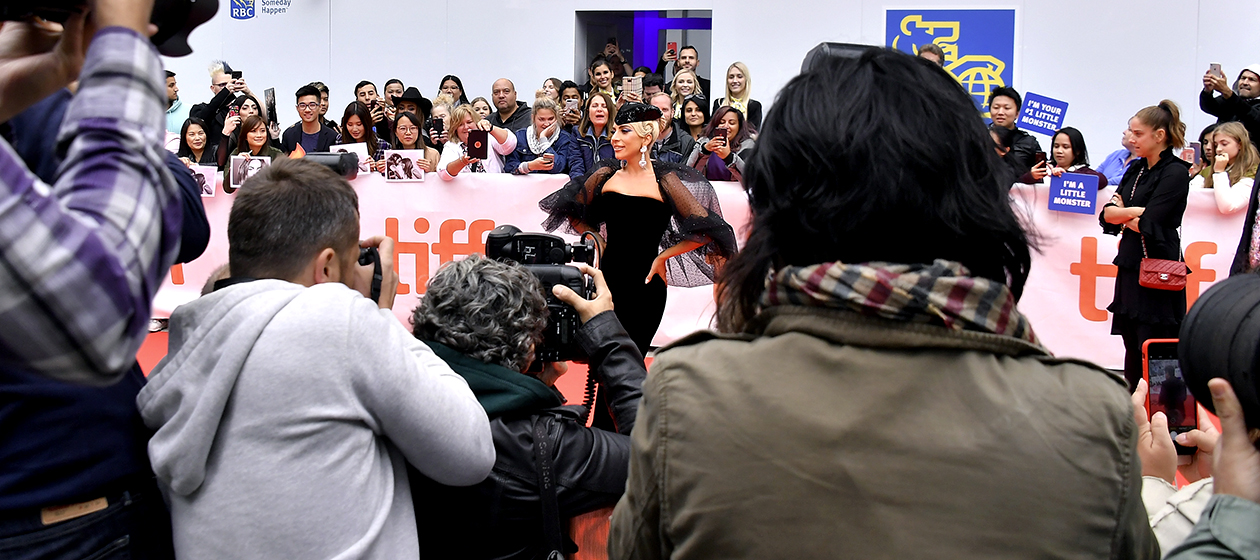What everyone is talking about at the Toronto International Film Festival
The biggest themes and buzziest films from the first half of the fest


Back in 2013, the Toronto International Film Festival helped kick off what turned out to be a close, thrilling Oscar race, when the fest showed both Gravity and 12 Years a Slave. Two years ago, the story was much the same, when TIFF had both Moonlight and La La Land. This year, the directors of all four of those films are back at the fest: Alfonso Cuaron with Roma, Steve McQueen with Widows, Barry Jenkins with If Beale Street Could Talk, and Damien Chazelle with First Man.
And yet, for the first few days of this year's TIFF, all anyone wanted to talk about was a very different showdown: Natalie Portman vs. Lady Gaga.
Lady Gaga gets her first leading movie role in A Star Is Born, a remake of a remake of a remake, directed by and starring Bradley Cooper. Heavily beholden to the 1976 Barbra Streisand/Kris Kristofferson version of this story, the new Star has Cooper playing Jackson Maine, an alcoholic roots-rocker who uses his fading fame to boost an amateur belter named Ally (Gaga), whose non-glam looks are counterbalanced by her big, angelic voice.
The Week
Escape your echo chamber. Get the facts behind the news, plus analysis from multiple perspectives.

Sign up for The Week's Free Newsletters
From our morning news briefing to a weekly Good News Newsletter, get the best of The Week delivered directly to your inbox.
From our morning news briefing to a weekly Good News Newsletter, get the best of The Week delivered directly to your inbox.
Cooper makes interesting choices here as both an actor and a director, playing his role with a gravelly cowboy voice, and keeping scenes very loose and improvisatory (with lots of swearing). The roughened edges add some personality to what's otherwise a slickly efficient melodrama, about one artist flaming out so that another can emerge from his ashes.
But it's Lady Gaga who's going to grab the most headlines when this picture opens wide on Oct. 5. While A Star Is Born lightly criticizes the music industry's way of processing and packaging talent, Gaga's take on Ally is essentially one long rebuttal argument, drawn from the actress' own experiences. Dye her hair, synthesize her backing tracks, surround her with backup dancers… It doesn't matter. When Lady Gaga starts to sing on screen, there's so much pure feeling, it's shattering.
Natalie Portman also plays a pop star, in another movie by an actor-turned-director whose name starts with "Brad." In the second half of Brady Corbet's bold and bracing Vox Lux, Portman is Celeste, a Gaga-level sensation with a Britney Spears-like past, checkered with scandal and self-abuse. At the dawn of the 21st century, Celeste's music helped buoy a nation reeling from mass shootings and terrorism. Now she's the disaster, and her fans mainly gather to celebrate her own endurance.
The first half of Vox Lux tells the teen Celeste's story, with all its eruptions of shocking violence and lost innocence. Taken all together, this is a film that positions pop music as a new religion, for better and worse. Vox Lux is way too experimental and cynical of a movie to become the kind of Oscar-contender that A Star Is Born will be. But Portman may sneak into the race anyway, because just as with Jackie two years ago, her intensity is riveting. To quote the movie: She's phenomenal.
A free daily email with the biggest news stories of the day – and the best features from TheWeek.com
Here's what else to look forward to coming out of TIFF, for Oscar season and beyond.
The contenders
Julianne Moore is at her best in Gloria Bell, director Sebastián Lelio's English-language remake of his own 2013 film Gloria, about a late-middle-aged divorcée who keeps embracing life — even when it won't hug her back. Lelio (who won the Best Foreign Language Film Oscar last year for A Fantastic Woman) replays his earlier film almost note for note. But these are strong, crowd-pleasing notes; and Moore throws herself completely into a role that will resonate with a lot of women of a certain age. Her kids are out of the house, she's still a decade away from retirement, and her health is slowly declining, but there's still plenty of juice left in the old gal.
Viola Davis is similarly triumphant in Widows, writer-director Steve McQueen and co-writer Gillian Flynn's adaptation of Lynda La Plante's British TV series, about a group of women who pull a heist when their criminal husbands die suddenly, leaving them in dangerously deep debt. Davis is surrounded by a great cast, including Liam Neeson as her husband, Michelle Rodriguez and Elizabeth Debicki as her fellow heisters, Daniel Kaluuya and Brian Tyree Henry as the crime bosses putting pressure on the ladies, and Colin Farrell and Robert Duvall as the heads of a Chicago political dynasty involved in all this dirty business.
There's a lot going on in Widows. (Perhaps too much, at times.) But an entertainingly twisty plot and some thoughtful Chicago location shooting offer plenty to hold just about any smart viewer's attention, while Davis gets busy telling the film's deeper story: about an aging, wealthy black woman, who becomes aware of how precarious her status is once she's in danger of losing all her money.
Writer-director Barry Jenkins takes those race and class critiques much further in his adaptation of James Baldwin's 1974 novel If Beale Street Could Talk. Kiki Layne stars as Tish, a woman who's barely out of her teens when she gets pregnant by Fonny (Stephan James), a carpenter and artist recently thrown in jail for a rape he didn't commit. Tish's family (including Regina King and Colman Domingo as her mom and dad) hustles and scrapes to pay a lawyer who might be able to prove that Fonny was framed by a racist cop.
As with Jenkins' Best Picture-winning Moonlight, the overarching story here matters less than the individual moments, which exhibit a rare sensitivity to the complex visual and emotional textures of a specific community. Even the sound of If Beale Street Could Talk is remarkable. This film is ultimately about how love and perseverance holds families together, even when societal institutions are determined to scatter and destroy them. So the individual scenes layer beautiful music and sweet words of reassurance over the ever-present dissonant howl of sirens and shouting, waiting just outside.
Peterloo isn't based on any particular piece of literature, outside of historical accounts of what happened in 1819, when working men and women held a universal suffrage rally in Manchester, England, and were attacked by troops and hired goons. Unlike filmmaker Mike Leigh's previous history-plays Topsy-Turvy, Vera Drake, and Mr. Turner, Peterloo is diffuse, following dozens of characters all moving toward an inevitable clash. But as always, Leigh crafts images that look like oil paintings hanging in a gallery, and then brings those pictures to life, letting us hear how yesteryear's rousing debates about labor and privilege keep echoing.
Foreign affairs
Sebastián Lelio isn't the only recent Best Foreign Language Film Oscar-winning director back at TIFF this year. Poland's Pawel Pawlikowski had a surprise arthouse hit in 2014 with the Oscar-winning Ida. His Cold War is another winner, made in a similar style: in high-contrast black-and-white, with a narrow 4:3 frame that makes the actors look like their surroundings are pressing down on their heads.
The story stretches from 1949 to 1959, following a musical director (Tomasz Kot) and a talented but impetuous singer (Joanna Kulig) as they chase each other back and forth across the Iron Curtain, pursuing both their art and an elusively idealized love. The movie looks and sounds fantastic, with stirring musical performances. But what's especially compelling is its core idea: that perhaps people are only truly happy, romantically and politically, when they think they're getting away with something forbidden.
Because it has American backers, Daniel Sawka's very of-the-moment Icebox likely won't qualify for the Foreign Language Oscar, although its gripping story about a Honduran immigrant who crosses the Arizona border and then is stranded in a U.S. detention facility puts a sympathetic human face on the current headlines.
There's also no way that Iran will submit 3 Faces, the latest attempt by dissident filmmaker Jafar Panahi to keep working even while the state has him on house arrest. Nevertheless, the movie's devilish blend of fact and fiction — as Panahi and actress Behnaz Jafari question cranky country folk while investigating whether a suicide video is real — couldn't be more relevant in this "fake news" era.
Olivier Assayas (who, surprisingly, has never won an Oscar) puts this same theme of truth vs. "truth" front and center in Non-Fiction. This rocket-paced, hyper-chatty dramedy concerns a group of interconnected Parisian artists, publishers, and politicos, who spend all their time either having affairs or sitting around debating whether modern technology has wrecked their lives. Reminiscent of one of those idiosyncratic '90s-era Woody Allen films that underlined its own meaning, Non-Fiction is blunt but still stirring, raising all kinds of provocative questions about whether it's possible to make personal art at a time when everybody's already sharing everything on Twitter.
And then there's Burning, Lee Chang-dong's disturbing masterpiece: a craftily creepy neo-noir about an aimless young man (Yoo Ah-in) who falls under the spell of a free-spirited former classmate (Jeon Jong-seo) and her rich, laid-back new boyfriend (Steven Yeun). The first half of the movie is a moody drama about a kid with no clue about how to get his life together. In the second half, "having no clue" takes on a different meaning, as the hero thinks (but can't prove) that he's on the trail of a serial killer. Based on a Haruki Murakami story, Burning is haunting and nail-biting — one of 2018's best films.
On the edge
Don't care about the Oscars, and just want to see something weird? Peter Strickland has followed up his 2012 "giallo" homage Berberian Sound Studio and his 2014 eurotica riff The Duke of Burgundy with another scrambled genre exercise, sure to beguile some cineastes and infuriate others. Strickland's In Fabric winks at the "haunted object" sub-genre of British horror anthology films, by introducing an unlikely villain: a red dress which eventually destroys everyone who wears it.
The film is divided into two parts: the first about a divorced single mother (Marianne Jean-Baptiste) trying to date again, and the second about a washing machine repairman (Leo Bill) unable to ask his fiancée for the kind of intimacy he prefers. Their stories echo and bleed into each other, tied together by a strange department store staffed by a Satanic coven. But that plot description suggests a narrative coherence that's not really a priority for Strickland. Instead he's mostly interested in kitschy old commercials, witches who talk weird, and hard-working middle-class folks caught in Kafkaesque existential nightmares.
Lastly, Ron Mann's Carmine Street Guitars has the basic form of a documentary: embedding in an unusual Greenwich Village music store for a week, watching the small staff build guitars and talk to customers. But Mann blends in scripted segments and musical performances, such that watching this film becomes like spending a pleasant day at the office — at a dream job — where moments of intense focus are broken up by idle chitchat.
Like Vox Lux, Carmine Street Guitars ends with a dedication to the late Jonathan Demme, which makes perfect sense. There's no one better to honor at TIFF than a successful, Oscar-winning director who loved music, loved film, and was such a humanist that he always believed that any person, at any time, could surprise you.
This is the first article in a two-part series on the buzziest movies and biggest themes of this year's Toronto International Film Festival.
Noel Murray is a freelance writer, living in Arkansas with his wife and two kids. He was one of the co-founders of the late, lamented movie/culture website The Dissolve, and his articles about film, TV, music, and comics currently appear regularly in The A.V. Club, Rolling Stone, Vulture, The Los Angeles Times, and The New York Times.
-
 The Week US subscriptions FAQ
The Week US subscriptions FAQHow to manage your subscription, get digital access, enquire about delivery problems and renew gift subscriptions
-
 10 upcoming albums to stream during spooky season
10 upcoming albums to stream during spooky seasonThe Week Recommends As fall arrives, check out new albums from Taylor Swift, Jeff Tweedy, the Lemonheads and more
-
 Crossword: September 11, 2025
Crossword: September 11, 2025The Week's daily crossword
